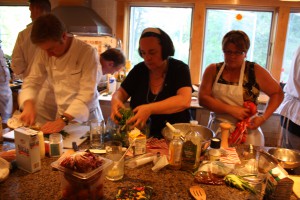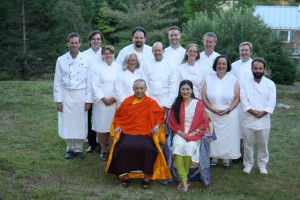Sunday
Community ArticlesAn Interview with Machen Corps Commander Michael Weiss
The Machen, in the Kalapa Court, is the court cook. The Machen are responsible for the nourishment of the Sakyong’s family and their guests. For the past 11 years the Machen Corps has been commanded by Mr. Michael Weiss. Hailing from the great state of Texas, Mr. Weiss has been a Shambhala practitioner for over 22 years. Mr. Weiss has a degree in philosophy and psychology from University of Texas-Austin. Khenchen Anthony Miller of the Machen Corps conducted this written interview with Commander Weiss about his experience serving in the Kalapa Court and as a Machen. This is Part One of a two-part interview.
How did you find your way to becoming a Machen?
Back in the late 1990s I was living at Rocky Mountain Shambhala Center, before it became SMC. I had started out at RMSC in the finance office along with Shambhala poet Katie Yates, and the two of us were working under the Finance Director at the time, Mr. Will Wolboldt. The finance office was a nice spot to work, but I found myself slowly migrating to the kitchen. I enjoyed cooking in that context, and people seemed to appreciate what I did. After a few short years, I became head of the kitchen at RMSC.
During my time at RMSC, I lived in a very small, hexagonal cabin perched up on a hill as you go towards the stupa. Folks who were at SMC for programs would often hike towards my cabin on days off, as it was visible from the road and was something of a curious landmark. On many occasions I would be in my cabin, trying to rest after a 60-hour workweek or trying to do my prostrations, and some nice friendly hikers, fresh off of a few weeks of shamatha meditation, would stop by and knock on my door, hoping to take a peek inside. I would typically respond to these uninvited visits with some degree of impatience or annoyance.
One day in the summer of 2000, on a Seminary day off, I got a knock on the door in the afternoon. It was the same thing–participants out hiking and curious about my hexagonal cabin. For some odd reason–maybe I had been reading Pema Chödrön or something–I decided to consciously reverse my usual response and, rather than being sullen and surly, to attempt to be gracious and hospitable. The hikers turned out to be Mr. Benjamin Medrano and another gentleman. I invited them in and asked them to stay and have a beer with me, even though I did not know them. I entertained them in this fashion in my little cabin until they became restless and left to continue their hike.
A year later, Ben Medrano was recruited as a Continuity Kusung for Sakyong Rinpoche. At that time, part of the CK’s job description was to make arrangements for campaign staff–basically to requisition all the staff who would be needed for a particular city center visit or teaching engagement. Ben remembered meeting me at SMC and called me up to inquire as to whether I would be interested in cooking for Rinpoche. I did not have too much going on work-wise at that time, so I said yes. I felt very inspired by what Rinpoche was doing, and I had mentally already made the aspiration that I wanted to do something–whatever it might be–to support Rinpoche in his work. Then the cooking thing came along, and there was sort of a joining of aspiration and opportunity.
What is the most challenging thing about cooking at the Court? What is the most rewarding part of cooking at the Court?
From a conventional professional standpoint, the most challenging thing about court cooking is the sheer number of variables from one day to the next. Things are always in movement at the Kalapa Court–from the timing of meals to the menus to the number of guests to the level of formality, and so on. In almost any other professional culinary situation, the number of variables is limited and defined by the Chef, or by the management, or by the company. This allows the kitchen to get very good at doing what they do; it also allows for processes to be optimized and standardized, and so on.
In the Kalapa Court kitchen, there is less opportunity for this sort of optimization or standardization. This means that the successful cook needs to be nimble and must be able to improvise, must be willing to push forward in imperfect circumstances, and must have a broad enough knowledge to be able to do a little bit of everything. If one comes from a very focused professional culinary background, the relative unpredictability and apparent lack of structure can be befuddling at best, maddening at worst. On the positive side, it’s a blast! If you have just the right amount of knowledge and daring and culinary skill, one can more-or-less chart one’s own course, improvise, and have fun.
The Sakyong and Sakyong Wangmo are very kind people, and they seem to understand that the job of Machen continually requires one to engage situations where there is a lack of clear precedent or established procedure. I have never found that there is an expectation that the Machen will do their job perfectly. I do find that the Sakyong and Sakyong Wangmo seem to appreciate that I am willing to try, and that I am willing to roll with the changes, so to speak. I get the sense that they are as much interested in the cook and in that person’s good lungta as they are in the food that the cook produces.
As for the most rewarding part of the job, I would say that a predominant one for me when I started was to develop some relationship with Rinpoche. I imagine that’s a big one for a lot of folks–to develop a relationship with Rinpoche and with Khandro Tseyang. There is a kind of magic happens when you cook in the Kalapa Court kitchen. In my experience, I actually become a far better cook than I am in any other circumstances! For whatever reason, I find that I can step up and perform at my best in that context. The Kalapa Court is a Kasung mandala, and there is something about it that feels very similar to other sorts of Kasung work. You put on your uniform, set aside your own preferences and concerns, and go to work. As it turns out, this is actually a very effective approach for getting things done and doing them well.
How often does a Machen serve?
The Machen Corps is a small group of 25-30 people. Most folks will find time to serve at least once a year, for anywhere from a day to one or two months. At present, we have one individual–Machen Marvin Robinson–who generously donates six months out of every year to serve in the Kalapa Court kitchen. While Machen Robinson is on duty, we will deploy other members of the Machen Corps in supportive roles–to assist with special events, retreats, time-off, and so on. For the other six months of the year, we assemble a rotating roster of cooks based upon the Sakyong and Sakyong Wangmo’s schedule, the availability of Machen Corps personnel, and other factors.
I would like to move the Machen Corps to a place where roles and relationships are more solidly established and more consistently functional. A key piece of this picture would be a full-time, year-round Continuity Machen. This individual would ideally serve a tour of multiple years. There would still be a significant role for all the other folks in the Machen Corps in this scenario. The Kalapa Court continues to expand and become more dynamic, and there is more than enough activity to keep the Machen Corps busy!
Stay tuned for Part 2 of the interview with Michael Weiss, coming soon!








May 8, 2015
Reply
Brilliant way to get this out. Very inspiring.
May 4, 2015
Reply
Thank you for sharing and appreciation to all the Machen who nourish the teachers and others!
We all “without doubt enjoy it!”
May 4, 2015
Reply
Very precious and special practice-thank Machen Corp Commander for sharing your journey and insights. Thanks to all who serve :-)